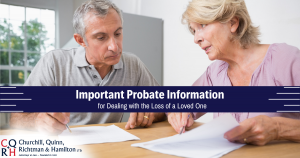5 Important Probate Questions Answered
 Probate is one of those topics that most people like to avoid. First, it usually means that someone has passed. And also, many people don’t even know what it means. However, at some point in your life you will probably be faced with this issue – and you will likely have a lot of questions. Luckily, we are here to help. Here are answers to some of the more common questions people have when it comes to probate.
Probate is one of those topics that most people like to avoid. First, it usually means that someone has passed. And also, many people don’t even know what it means. However, at some point in your life you will probably be faced with this issue – and you will likely have a lot of questions. Luckily, we are here to help. Here are answers to some of the more common questions people have when it comes to probate.
What is probate?
Probate is the legal process of administering a person’s estate after they pass away. This would include things like carrying out the instructions in the will, distributing assets, paying taxes, and more.
Is probate a complicated process?
The process of legally closing out an estate can be complex, often involving many steps to complete it correctly. The executor of the estate, who is ideally named by the decedent in a will before they have passed, is in charge of carrying out the process. Some of the major duties of the executor include:
- Files the appropriate documents with the court and is granted authority to settle the estate
- Sends notice to any interested parties, such as relatives or others named in the will, and creditors
- Takes an inventory of all of the estate’s assets
- Distributes the assets
- Pays any debts or taxes
- Files appropriate paperwork to close the estate
What can make the process easier?
The probate process can be made much easier for your loved ones if you plan ahead. In that respect, one of the most important things you can do while you are living is to prepare a will. This important document will detail your specific wishes regarding the settlement and distribution of your estate and will allow you to name a responsible executor that you trust to carry out those wishes appropriately. On the other hand, if you pass away without a will the state will decide how things get distributed. Additional ways to make probate easier would be to designate a beneficiary on your accounts, or create a trust that will directly pass certain assets or property to a specific beneficiary without probate.
Does every estate need to go through probate?
In Illinois, not every estate is required to go through the probate court. For a smaller estate worth less than $100,000 and with no real estate involved, a small estate affidavit could be used to claim the estate. Additionally, there are certain assets that do not need to be considered part of the total value of the estate, and do not need to go through probate. These would include:
- Property or assets that are owned jointly with a spouse, such as a joint checking account or a home with both spouses on the deed
- Assets that are included in a revocable trust
- Accounts with a specific beneficiary listed
- Property or accounts that include a “transfer on death” beneficiary
Who can I go to for help with the probate process?
While it is possible to go through the process without an attorney, it is highly recommended to work with a qualified lawyer with experience in probate law. The probate process can be very complex and you will probably have MANY questions along the way. Even a seemingly simple estate can get complicated quickly, if documents have not been filed properly or the will gets unexpectedly contested. The experienced attorneys at Churchill, Quinn, Richtman & Hamilton, Ltd can help you get your estate in order by preparing important documents now, to make things easier for your heirs after you pass. Additionally, we can be a trusted expert to answer all of your important questions if you are in charge of settling a loved one’s estate.
We handle probate estates of all sizes and complexities, and represent trustees, beneficiaries, personal representatives, heirs, creditors and more. Contact our Grayslake office at 847-223-1500 to learn more about how we can make this complicated process so much easier, and give you peace of mind during a very difficult time.
